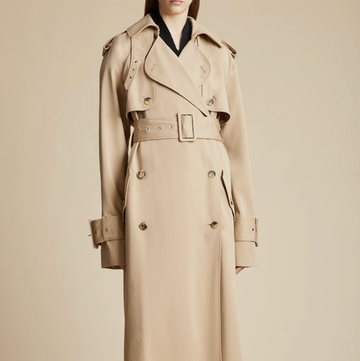It's taken you years to find your favorite fashion pieces—the perfect little black dress or those worn-in, slimming jeans you can't live without. The last thing you want to do is ruin them in the washing process. Rhonda Vitoulis, a fabric specialist who has worked for Spanx, Alice & Olivia, and Jill Stuart, shared the most common washing mistakes she's seen in the business—and the hacks that will make you rethink the way you clean your clothes.
You spray perfume and Febreeze on clothing.
We've all done it—reached for our favorite blouse after a few too many wears and relied on a spritz of perfume to get rid of the stink. But dousing your clothing in perfumes and Febreeze is essentially drowning them in fragrant oils—and oils stain clothing. Unlike pasta sauce or ice cream stains that wash out with detergent, though, Vitoulis says these stains are virtually impossible to get out. Then they go and trap future oily stains, turning your wardrobe into a collection of stained and icky garments (gross). The perfume "walk-through"—misting perfume and then walking through it for a less intense dose—is also a laundry don't. Keep the spray pointed toward the wrists or neck only, and away from your clothes. If they're truly that stinky, just suck it up and toss in the washer—it's as simple as that.
You use the recommended amount of detergent and fabric softener.
Vitoulis says you only need to use half the amount the manufacturer is advising you to use. This will save you money and will expose your garments to fewer chemicals, ensuring they stay in mint condition. "Typically, a front-loader uses less water than a top loader, but most detergent bottles instructions are based on top loaders (unless specifically noted) and therefore typically advise to use more detergent than necessary," she says. She also assures us, based on her lengthy experience in fabric research and development, that you'll get the same result with half the amount—clean clothes.
You follow the cleaning tag instructions.
The majority of your wardrobe, even if the tag recommends dry cleaning, can be tossed in your washing machine. Many companies fear returns or are too lazy to offer garment specific directions, and therefore include the dry cleaning suggestion, says Vitoulis.
That said, structured blazers or dresses should be dry cleaned, but that's about it. If you're nervous about putting an item in the wash, she recommends hand washing and hang drying instead.
You use a top-loading washing machine.
Front-loading washing machines are far better for clothing, says Vitoulis. They require less water, less detergent, and less fabric softener (saving you money), and they cause less friction, which also means less wear and tear on your clothing. Front-loading machines don't have an agitator, the center cylindrical piece found in a top-loading washer, which—as the name suggests—agitates, or creates friction and breaks down your clothing over time.
You're afraid to wash leather.
"Think about it, cows live outdoors and stand in the rain all the time," says Vitoulis. "Granted, the leather has now been treated, but in 99 percent of cases, especially with black or light-colored leather, it can be machine washed." The only pieces you must wash cautiously are structured leather pieces, or pieces with contrasting leather colors, she says. In that case, spot clean or send it to the cleaners.
You dry your workout gear.
Every time you wash and dry your moisture-wicking athletic gear, you're breaking down the sweat-wicking components of the fabric, says Vitoulis. We know it's impossible to avoid washing these items (no one wants to workout in a stinky gym outfit), but let them hang dry. Same goes for sun-protective clothing pieces like swimwear and rash guards.
You use a dry cleaning service.
"Dry cleaning is in fact stain inducing," Vitoulis explains. The process used involves many chemicals, which can stain or alter the color of clothing over time. Now, dropping off your white winter jacket at the end of the season isn't going to do a ton of damage, but if it's something you wear on the reg, wash it at home to ensure fabrics and colors stay intact. You'll never have to worry about yellowing white garments again.














